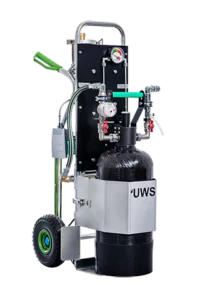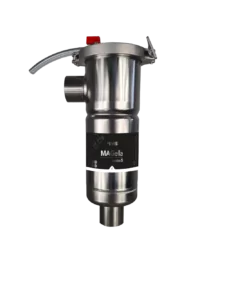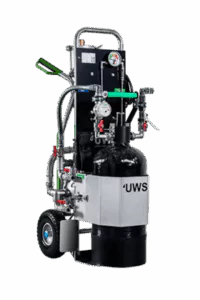What does heating water treatment actually mean – softening vs. desalination
Clarity for the practice
Many people talk about water treatment – but what exactly does it involve? Anyone who works professionally with heating systems must understand the terms softening and desalination but must also be able to classify them correctly. This is because the differences have an enormous impact on corrosion protection, compliance with standards and the service life of the system.
The VDI 2035 makes it clear:
Depending on the system structure and material combination, pure softening is not enough – you can only achieve truly “chemically calm” water with desalination.
Softening: Limescale prevention – nothing more
During softening, the heating water is passed through an ion exchanger that exchanges calcium (Ca²⁺) and magnesium (Mg²⁺) for sodium ions (Na⁺).
Result:
- The total hardness decreases → less lime
- No stone formation in heat exchangers
But:
- The sum of dissolved ions remains almost the same
- The conductivity remains high or increases slightly
- Risk of corrosion remains
Conclusion: Softening protects against limescale, but not against corrosion. For many systems, this is not enough – especially with aluminum components or mixed installations.
Desalination: corrosion protection through ion discharge
Desalination goes one step further: here, the heating water is treated via a mixed bed resin a combination of cation and anion exchangers. This not only removes the hardness formers, but also corrosive anions such as:
- Chloride (Cl-)
- Sulphate (SO₄²-)
- Nitrate (NO₃-)
removed from the water.
Result:
- Significantly reduced conductivity (<100 µS/cm)
- Minimized corrosion potential
- VDI-2035 & Co compliant water quality
The effect in the system: the heating water becomes “chemically calm“. This means: no electrochemical reactions, no pitting, no material stress.

Heaty Ferriline No. 2
Complete unit for professional bypass treatment, sludge and magnetite filtration in the hot water area incl. MAGella twisterTo the product
Other important measures in the preparation process
Magnetite deposition
Sooner or later, magnetite (Fe₃O₄) – fine iron oxide sludge – forms in systems with iron or steel. This clogs heat exchangers, valves and pumps.
Solution: Installation of a magnetite separator (e.g. from our MAGella series)
Particularly useful for old systems or after hydraulic balancing.

MAGella twister5
The dual filters in the MAGella twister series are unique, highly efficient system filters for magnetic and non-magnetic contaminants in heating and cooling systems. They include an absolute fine filter up to 1 μm and one of the most powerful magnetite filters on the market.To the product
Degassing
Dissolved oxygen in heating water is a first-class corrosion driver. Oxygen ingress is a permanent problem, especially in plastic pipe systems without a diffusion barrier.
Solution: Vacuum degassing or inline degassing for ongoing operation or after filling
Oxygen content below 0.1 mg/l is the target value according to VDI 2035.
Filtration
Untreated systems often carry particles, suspended matter, sand or soldering beads – e.g. after new construction or renovation.
Solution:
- Filtration devices or treatment devices with fine filters (such as our Heaty Filtra Advanced or Heaty Profiline)
- Dual filter with fine filter and magnetite separator
Provides lasting protection for fittings, pumps and heat generators.

Heaty Profiline No. 2
Complete unit for professional bypass preparation, magnetite filtration and filtration incl. Hot water pumpTo the product
Why “chemically calm water” is the goal
The less is contained in the water, the less can happen in the system.
Desalinated, degassed and filtered heating water reduced:
- Corrosion processes
- Limescale deposits
- Magnetite formation
- Downtimes & maintenance costs
The system runs more efficiently, more reliably and remains within the manufacturer’s specifications.
Conclusion: Reconditioning means more than just reducing hardness
Water treatment is an overall concept – not just a softening cartridge in the filling hose.
Only by combining desalination, degassing, magnetite separation and filtration can you achieve water that really protects modern heating systems.
Recommendation for SHK professionals:
Rely on complete heating water treatment – with tried-and-tested solutions from UWS Technologie that meet the requirements of VDI 2035, ÖNORM H 5195-1 and SWKI BT 102-1.



